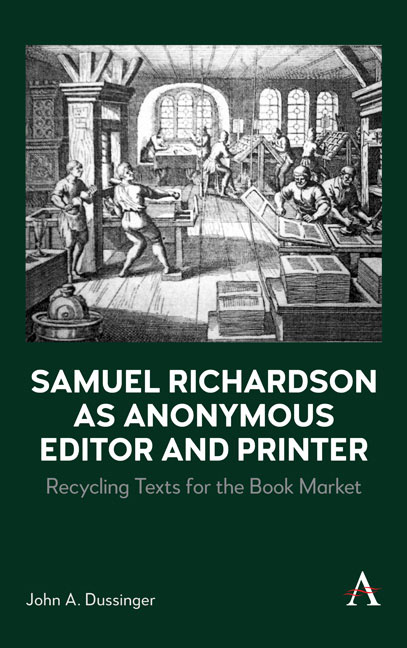Book contents
- Frontmatter
- Contents
- 1 Introduction to The True Briton: Oaths of Allegiance and Women’s Empowerment
- 2 Selected Texts of The True Briton
- 3 Introduction to The Weekly Miscellany: Sarah Chapone, Women’s “Championess”
- 4 Selected Texts of The Weekly Miscellany
- Conclusion: Richardson’s Press and Women’s Entry into Public Life
- Bibliography
- Index
3 - Introduction to The Weekly Miscellany: Sarah Chapone, Women’s “Championess”
Published online by Cambridge University Press: 13 April 2024
- Frontmatter
- Contents
- 1 Introduction to The True Briton: Oaths of Allegiance and Women’s Empowerment
- 2 Selected Texts of The True Briton
- 3 Introduction to The Weekly Miscellany: Sarah Chapone, Women’s “Championess”
- 4 Selected Texts of The Weekly Miscellany
- Conclusion: Richardson’s Press and Women’s Entry into Public Life
- Bibliography
- Index
Summary
William Webster and Richardson
If, as printer of the True Briton, Richardson took considerable risks to support the Duke of Wharton's campaign against Walpole's government, his work for the improvident clergyman William Webster (1689–1758) reveals again how seriously he regarded the press as a medium equivalent to the pulpit in promulgating the business of the state church.
The Weekly Miscellany, edited by William Webster, under the pseudonym of Richard Hooker of the Temple, was published Saturdays from 16 December 1732 through 27 June 1741 as a single sheet. Richardson printed the first 209 issues, the last on 11 December 1736. […] A letter from Webster admits that at the time of writing (15 July 1738) he still owed Richardson the sum of ninety pounds, a debt Richardson generously later forgave.
As we shall see while tracing his own interventions in this journal, besides his genuine concern for poor clergymen, it is not unlikely that Richardson valued the ample opportunity this journal provided him as a developing writer and a means of advertising his publications.
Webster himself confessed that he was seduced by Richardson's fictional female voice: “while you are alive you can, whenever you please, make any body Cry, or Laugh; and when you Die, you’ll make Every body Cry whether you write, or not.” A few years after this remark, while undergoing bankruptcy and failing to get relief from the archbishops and bishops, Webster wrote A Plain Narrative of Facts, or, the Author's Case Fairly and Candidly Stated, By Way of Appeal to the Publick. After profuse thanks to a parishioner for his financial support, Webster singles out
another Person, not the less honourable for not being a Gentleman, who is absolutely the greatest Genius, the best and the most amiable Man, that I know in the World; I mean, Mr. Richardson, the Printer. When I came to Ware, I was £90 in his Debt, tho’ I had clear’d off regularly, by quarterly Payments, £50, and never could save any Thing out of my Income ever since the Change of my Livings, towards getting out of Debt.
- Type
- Chapter
- Information
- Samuel Richardson as Anonymous Editor and PrinterRecycling Texts for the Book Market, pp. 29 - 46Publisher: Anthem PressPrint publication year: 2024

